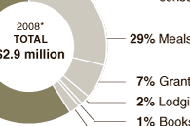Vermont Acts to Make Drug Makers’ Gifts Public
Multimedia
The law, scheduled to take effect on July 1, is believed to be the most stringent state effort to regulate the marketing of medical products to doctors. It would also ban nearly all industry gifts, including meals, to doctors, nurses, medical staff, pharmacists, health plan administrators and health care facilities.In practice, the new law would let Vermonters learn each year which doctors have been paid, and how much, by the makers of the brand-name drugs for which they wrote prescriptions ”” or how much money certain surgeons have received from the makers of the stents, pacemakers, artificial knees and such that the doctors implanted.
The action by Vermont has been watched around the country, as national legislators and medical groups look for links between industry marketing and health care costs.
Minnesota already requires drug companies to report payments to doctors. NewMassachusetts regulations limit gifts to health care practitioners and call for disclosure of any payment or benefit worth $50 or more.
In Congress, Senators Charles E. Grassley, Republican of Iowa, and Herb Kohl, Democrat of Wisconsin, have sponsored a bill requiring disclosure of pharmaceutical industry payments to doctors.
But Vermont has gone further with its new law, which Gov. Jim Douglas, a Republican, is expected to sign by early next month. It will require public disclosure of all payments by companies to any health care provider with authority to write prescriptions for drugs, medical devices and biologics, drugs that are typically administered by injection or infusion.
The law is also the first to ban all free meals, long a favorite gift in marketing to doctors. The law also closes a loophole in previous regulations that had allowed companies to keep specific expenses private by claiming them as trade secrets.
The required disclosures, though, do not include payments for clinical research on products under review by the Food and Drug Administration.
“This is a much more comprehensive law because it makes clear ”” whether devices, biologics or drugs are involved ”” the issue is inappropriate gift-giving,” said Sharon Treat, the executive director of a nonprofit group, the National Legislative Association for Prescription Drug Pricing, and a Democrat in the Maine House of Representatives.
The Vermont law promises to provide a window into the considerable efforts and spending by device and drug makers to woo doctors even in a small state.
Makers of medical products spent about $2.9 million in fiscal year 2008 on marketing to health care professionals in Vermont, according to a report last month from the state’s attorney general. Of Vermont’s 4,573 licensed health practitioners, almost half received remuneration, including payments for lectures, meals or lodging from pharmaceutical companies in the 2008 fiscal year, the report said.
“If the drug industry gives $3 million on average for three years now to physicians in a small state like Vermont, what is happening in California and New York?” said Ken Libertoff, director of the Vermont Association for Mental Health, an advocacy group that supported the law.
The Vermont attorney general’s report, compiled before passage of the law, provides only aggregate data because companies declared 83 percent of the payments to be trade secrets. Even so, without naming names, the disclosed expenses highlighted a widely used industry strategy of focusing much of the marketing money on a group of influential doctors.
Of the $2.9 million spent in Vermont, for example, about $1.8 million went to only 100 health care providers. That meant only about 4 percent of doctors received 60 percent of the payments, the report said.
A psychiatrist received about $112,000, the highest amount spent on one person. But specialists in internal medicine, neurology, endocrinology anddiabetes also received more than $100,000 each during the year.
To reduce the perception of undue industry influence, the Pharmaceutical Research and Manufacturers of America or PhRMA, a trade association, instituted a voluntary code in January that prohibits noneducational gifts to doctors and restricts meals. About 50 manufacturers the code.
With such a code, Vermont’s new reporting requirements seem redundant, said Marjorie E. Powell, a senior lawyer for PhRMA.
“We think this is unnecessary, and it is not going to improve patient care,” Ms. Powell said. “It makes it onerous not only for the company but also for the physician in Vermont, because this is going to be on a Web site.”
But the Vermont Medical Society, which represents 65 percent of the physicians in the state, supported the bill.
Peter Shumlin, president pro tempore of the Vermont state senate, said he hoped his state would provide a model on marketing disclosures for the rest of the country.
“Our goal is not to prohibit this practice,” Mr. Shumlin said, “but to have the first system in this country where providers’ acceptance of this money is on full public record.”


